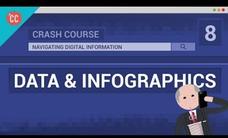Crash Course
Data and Infographics: Crash Course Navigating Digital Information #8
One-hundred percent of those reading this sentence are human beings. Wait, what? With part eight in the Crash Course: Navigating Digital Information set, pupils learn how to think critically about statistics. Scholars discover how...
TED-Ed
Haptography: Digitizing our Sense of Touch
We have cameras to record what we see, but how can we record what we touch? Katherine Kuchenbecker, a mechanical engineering professor at the University of Pennsylvania, is working to answer exactly that question. Using sensitive...
Common Sense Media
What Is Digital Citizenship?
Spark scholars' interest in becoming a super digital citizen with a brief, yet informative video that details what digital citizenship is and why it's important.
Curated Video
Online Reputation and Cyber-bullying
Combat cyberbullying with information. During this plan, learners watch a couple of videos, consider online behavior scenarios, brainstorm long- and short-term consequences, and discuss how to react to bullying in order to build up to...
Curated Video
Privacy Part 2
Why is online privacy so important? Explore privacy with a group assignment for which pupils create word clouds with words they associate with privacy. A discussion and online activity follow. Learners will read articles, explore the...
Crash Course
Social Media: Crash Course Navigating Digital Information #10
Sixty-eight percent of adults in the United States get their news from their social media feed. What are the consequences? Scholars dive into the topic with a video on digital media. They discover how social media shapes people's offline...
Crash Course
Who Can You Trust? Crash Course Navigating Digital Information #4
The best way to understand a website is (drumroll, please) ... to leave the website? Scholars make sense of some strange advice by watching part four in the Crash Course: Navigating Digital Information set. As they watch, they learn...
Crash Course
Using Wikipedia: Crash Course Navigating Digital Information #5
Wikipedia may get a bad rap, but does it have any redeeming qualities? As it turns out, it does, and scholars discover what they are with part five from the Crash Course: Navigating Digital Information video series. Pupils learn about...
Crash Course
Evaluating Evidence: Crash Course Navigating Digital Information #6
How do scholars learn to differentiate between good evidence and not-so-good evidence? The sixth installment from the Crash Course: Navigating Digital Information set is a great place to start. Pupils discover how to find reliable...
Crash Course
Evaluating Photos and Videos: Crash Course Navigating Digital Information #7
When it comes to viewing videos and photos on the Internet, seeing is not always believing. With part seven from the Crash Course: Navigating Digital Information series, scholars learn that even image-based evidence can be unreliable....
TED-Ed
A Digital Reimagining of Gettysburg
Why would Robert E. Lee order Pickett's Charge, an action that changed the course of the Civil War? Geographer and historian Anne Knowles uses digital technology to explain what she thinks is the missing piece in trying to understand...
TED-Ed
Getting Started as a DJ: Mixing, Mashups and Digital Turntables
What do Paris Hilton, Avicii, Diplo, and Cole Plante all have in common? They're DJs! Seventeen-year-old Plante is featured in a short video in which he demonstrates his art and encourages others who might be interested in pursuing a DJ...
Curated Video
Detecting Lies & Harmful Links
Who and what can you trust online? How do you know? After viewing a pair of introductory videos on positive and safe online conduct, learners discuss the content and put it into practice during an online search activity about alien life.
GCFGlobal.org
Recognizing Persuasive Language
Lose 10 pounds in one day, guaranteed! With the sixth installment from the digital media literacy series, scholars identify common types of persuasive language. They learn to look beyond techniques such as telling stories, presenting...
GCFGlobal.org
Judging Online Information
Limitless knowledge is only a mouse click away, so how can people make sure they're getting the best information possible? Using the first video in the digital media literacy series, scholars learn how to evaluate the information they...
Khan Academy
Place Value 1
Khan Academy assists your learner in grasping the concept of Place Value. Students will break down the number 4356 as 4 thousands + 3 hundreds + 5 tens + 6 ones, and then labels the number by place value. This video would be most helpful...
TED-Ed
What "Orwellian" Really Means
Is the term Orwellian itself an example of double speak? Often it is, according to this short video that examines George Orwell's warnings about how language can be used to control thought. A great resource for today's digital natives.
California Academy of Science
Your Digital Footprint: Data and Energy Use
Understanding energy usage requires knowing more than how much energy it takes to charge your cell phone. Scholars learn each text sent uses energy as does each video, game, and phone call. They observe the larger grid of data transfers...
TED-Ed
How High Can You Count on Your Fingers?
Is it a coincidence that fingers are called digits? Did you know that one finger can represent one digit or even six parts? Watch a somewhat confusing video that explains the possibilities of counting to numbers higher than 10 on your...
GCFGlobal.org
Deconstructing Media Messages
What are media messages really saying? Scholars use the seventh installment from an extensive digital media literacy set to answer the question. They discover how to deconstruct media messages by asking about the source, recognizing...
Lesson Planet
EdTech Tuesdays: Exploring Music in the Classroom with Michael Medvinsky
Young musicians, using both acoustic and digital instruments, hook up with young poets to produce their own songs through a program imagined by Michael Medvinsky.
Crash Course
Georges Melies—Master of Illusion
The focus of a playlist on the history of film shifts from the development of early film technology to techniques used by filmmakers like Georges Melies. Melies, a former magician, used dazzling illusions and tricky editing to create...
TED-Ed
The Demise of Guys
Girls are outperforming boys at all levels from elementary to graduate school. Psychologist Philip Zimardo considers the reasons why boys are struggling today, including the possible effects of excessive Internet use and the idea that...
Be Smart
Why I'm Scared of Spiders
Eighty-four percent of people have an irrational fear. This video focuses on a fear of spiders. It explains the different types of fear, the conditioning that creates fear, and the evolutionary advantage to these fears. It doesn't just...

























